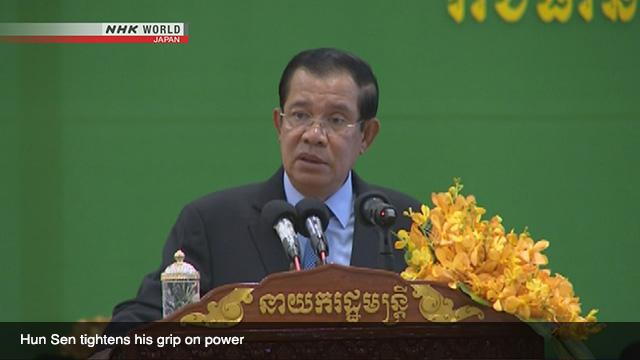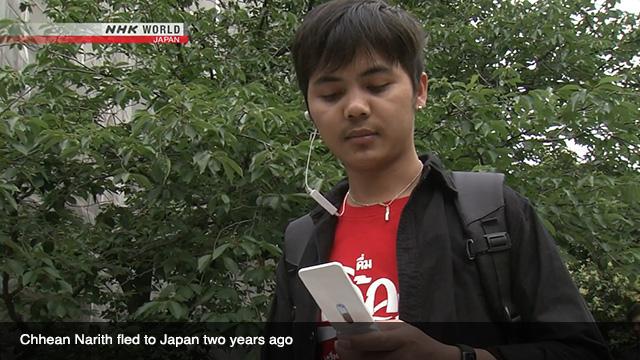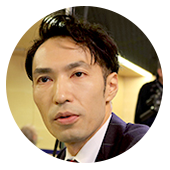Hun Sen becoming a "dictator"
"We need to bring about democracy!" -- I first heard these voices, filled with desperation, at an April gathering of Cambodians living in Japan.
Cambodia's former opposition leader Sam Rainsy was there to discuss what needs to be done to turn things around in the country. Sam Rainsy is a self-exiled opposition leader.
I learned about the magnitude of the problem at the gathering. Prime Minister Hun Sen is cracking down on the country's people and media.

The main opposition Cambodian National Rescue Party was ordered that it be dissolved, and some media outlets that were critical to the regime were also forced to shut down.
Some opposition lawmakers have been arrested. They were allegedly plotting to topple the government. Western nations are strongly criticizing Hun Sen, and some Cambodians are condemning him and calling him a dictator.
Shattering Japan's legacy
The purpose of Sam Rainsy's visit to Japan was to start a pro-democracy movement among Cambodians in the country, and to seek support from the Japanese government. There is good reason Sam Rainsy wants his voice heard in the country.

Not only has Japan been the biggest provider of aid to Cambodia among democratic nations -- it has also played an important role in democratizing the country.
Japan has sent Self-Defense Forces personnel and civilians to Cambodia since a Paris peace accord was signed in 1991 after a long civil war. The Japanese sent over to the country have been making sure that there are no disturbances, and that there is electoral justice.
But during peacekeeping operations in Cambodia, 2 Japanese civilians were attacked and killed by armed groups. Many Cambodians at the gathering said the legacy that Japan has helped the country build is shattering.
Boycott the election
I met Hay Vanna, the organizer of the protest, at the gathering. He came to Japan 10 years ago as an exchange student, hoping to work in the country. He now works as an economic consultant.

Hay Vanna is not originally a political activist. He says he simply wanted to do something for his family and friends back home.
He told me he feels a sense of responsibility. He knows his friends wouldn't be able to raise their voices without getting arrested.
I was in touch with him for weeks, filming his preparations for the protest. Every experience was a first -- making banners and placards, and persuading friends to join the cause.
His message was simple: Boycott the election. He claims the upcoming election with no major opposition party is totally illegitimate.
Thanks Japan, but...
But one thing Hay Vanna was not certain about was how to ask the Japanese government to deal with the issue.
Despite feeling grateful for its assistance to his country, he also felt frustrated that it decided to offer aid for the July election.
Hay Vanna thinks Japan's assistance will validate its legitimacy. The United States and the European Union have withdrawn assistance, criticizing Hun Sen.
Hay Vanna and his friends spent hours discussing how to approach the Japanese government. They eventually decided to ask it not to acknowledge the election result.
Getting the message across
Another concern Hay Vanna had was on how to gather people who would take part in the protest. He used social media.
The others who were planning to participate posted videos of their activities on Facebook, and asked for them to be shared as widely as possible.
Still, he wasn't sure how many people would actually join. He told me that it would be great if he could get 300 people.

On June 17th, the day of the protest, I was surprised at the size of the crowd. It turned out about 1,200 people had gathered. Given there are about 6,000 Cambodians in Japan, the size of the protest certainly showed how seriously they take the issue.
I have covered many protests, but this one stood out for its number of foreign participants and its energy. As they marched through central Tokyo, many Japanese pedestrians stopped to see what they were protesting.
A Japanese woman on the street who was watching said she was not aware of the suppression in Cambodia. She also said she feels sympathy towards the protesters, and hopes change will come.
Fleeing Cambodia to escape persecution
I was also surprised to find that most protesters agreed to be filmed, as people who take part in such activities usually refuse. I asked some of them why and they said they don't plan to go home, or they can't, until Hun Sen steps down.
Among them was Chhean Narith, a 26-year -old Cambodian who came to Japan 2 years ago. He told me he is seeking asylum in Japan. He said he fled his country out of fear of getting arrested.

He said he started getting threatening voice mails after taking part in an anti-government protest in Cambodia. He also noticed police officers around his home, watching him.
He said he brought many friends to the protest -- all of them asylum seekers who came to Japan within the last couple of years.
His story surprised me, as when I hear about asylum seekers from Cambodia, I imagine those that fled back in the 70s to escape civil war. But apparently, there have been more in recent years.
What will Japan do?
A couple of days after the protest, Hay Vanna visited the Japanese Foreign Ministry along with his friends to hand over a petition. It asks the Japanese government to demand Hun Sen release opposition lawmakers in custody.
It also demands that Japan withdraw its financial assistance for the upcoming election. The Foreign Ministry responded that Japan will keep urging the Cambodian government to reflect the people's will and to hold the election in a fair manner.

Japan is set to chip in about $7.3 million for the election. One of the reasons it's reluctant to withdraw assistance is its interest in the region. China's presence in Cambodia is rapidly growing.
Japan is concerned that China's influence in Southeast Asian nations will grow, both on land and in the waters.
Sources say Japanese government officials believe the withdrawal of Japan's assistance will strengthen China's influence in Cambodia, and that will fly in the face of democracy.
As a journalist...
Nations must consider political impact when making diplomatic decisions.
But when I hear the voices of Cambodians in Japan, wishing for peace and democracy, caring for their loved ones back home, and hoping to go back to their homeland someday, I can't help wishing that the international community would place Cambodians' interests first.
As a journalist, I also hope to closely watch the developments that may take place in the coming weeks, and help democracy take root in Cambodia by reporting on the issue in depth.

